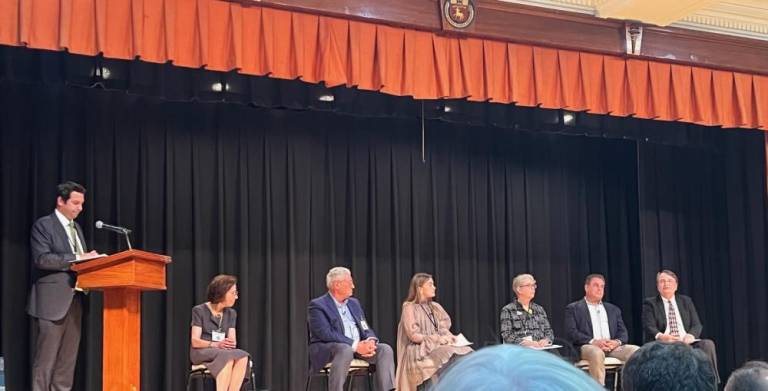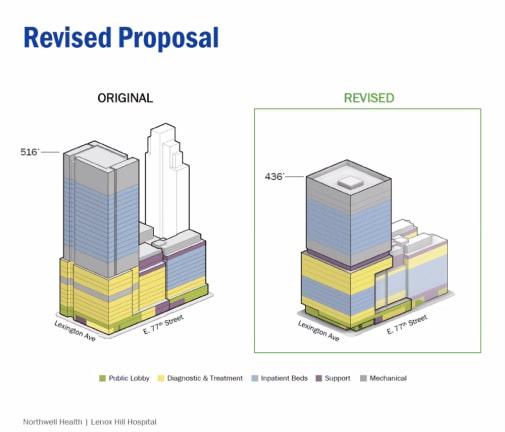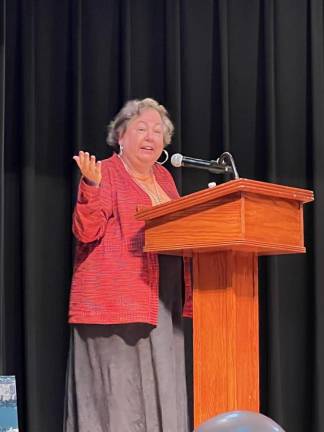UES Crowd Packs Local High School to Decry Lenox Hill’s Proposed $1.6B Expansion Plan
The new hospital building, slated to modernize the hundred-year-old hospital at Lexington Ave. & E. 77th St., is estimated to take eleven years to construct and will cost $1.6 billion. It will only contain 25 new beds. Northwell Health claims the expansion will eliminate double-capacity rooms & expand the hospital’s emergency department, but a hundreds-strong crowd of concerned UES residents still wanted nothing to do with it.



As Northwell Health moves forward on a $1.6 billion Lenox Hill expansion that is estimated to take 11 years, community opposition to the project continues to grow. On September 20, hundreds of UES locals packed the gymnasium of St. Jean Baptiste High School for a panel discussion on the hospital’s plans, which was staged by The Committee to Protect Our Lenox Hill Neighborhood. Speakers on hand almost uniformly pilloried Northwell.
Northwell’s expansion, which would connect to Lennox Hill’s current location at Lexington Ave. & E. 77th St., would feature twenty-five additional hospital rooms. It would also eliminate double-occupancy rooms, expand emergency bays, and boost the size of operating rooms. Opponents of the project have seized on the new-room statistic as woefully meager, especially given the projected duration of the construction.
Northwell is still seeking a zoning variance that would allow the tower to be built, considering that it will be about 436 feet tall. While this proposal would make it significantly taller than neighboring buildings, 80 feet have been already been chopped off the original blueprint. The hospital maintains that it needs a state-of-the-art facility to keep pace with competitors.
Stephanie Reckler, a Committee to Protect the Lenox Hill Neighborhood executive member, kicked off the event by describing the committee’s extensive grassroots campaign against the hospital.
“We are up against the largest employer in New York State, a [multibillion dollar] corporation. That makes Northwell a formidable opponent, but not unbeatable,” Reckler proclaimed, adding that “we are here tonight to show Northwell that our numbers mean something. We need to be heard, they need to listen to us.”
District 28 State Senator Liz Krueger (who represents Gramercy, Murray Hill, and part of Midtown) then took a turn at the mic, wasting no time in starting the pile-on in earnest. Referring to the area as “bedpan alley” due to the sheer wealth of already available “great [medical] institutions,” she bluntly said that “this is not the right place” for Lenox Hill’s expansion. She received hearty applause.
Krueger went on to elicit laughter by recalling a conversation with a Northwell rep: “He said that ‘we need to be here with our largest, best newest hospital, because everybody else is here.’ I said, ‘that’s not a reason!’ He said that ‘everybody needs to be near Bloomingdale’s.’ It’s not a retail specialty, it’s a hospital!”
A aide for U.S. Representative Jerry Nadler then took a turn at the podium, cracked a joke about Nadler needing to be in Washington to prep for an imminent government shutdown, and promptly noted that the congressman supported the community and found Northwell’s expansion to be “a monstrosity.”
Then the panel, moderated by Zack Fink of NY1 fame, finally got underway (Fink has since retired from journalism, and clarified that he was now serving as a lobbyist for the Committee). Featured speakers included venture capitalist Andy Gaspar of the Committee, Anna Marcum of Friends of the Upper East Side, health equity advocate Lois Uttley, real estate manager and Committee member Richard Scharf, and zoning expert George Janes.
In a seeming reference to the zoning variance Northwell is currently seeking from the DOB, Janes said what is “exceptional” about the tower is its size. “It’s an enormously fat tower. The thing about zoning...is that as you pull up [in height], you’ve got to set back and make it smaller and smaller...so you can see the sky, and so that light reaches the street,” he elaborated. According to Janes, the expansion meets none of these principles by being not only tall, but wide.
Marcum, a preservationist, said that the unusual proportions of the expansion would “disrupt a great deal of the sense of place and livability” of the Upper East Side, especially given the projected construction time.
In fact, the sheer length and conceivable inconvenience of that construction is what seemed to irk everybody in the room the most. Fink insinuated that he believed the construction would go on for “much, much longer” than Northwell maintains, with increased noise pollution and travel disruptions.
Gaspar noted that the expansion would be akin to the construction of the 2nd Avenue subway, which he claimed tanked real estate values and bankrupted small businesses. “Nobody wants to move into a construction area,” he ominously intoned.
Uttley shifted the conversation a bit by noting that she thought the expansion would in “no way improve health equity. It’s only giving more and fancier hospital beds to people who already have lots of hospitals beds in their neighborhood.” Strikingly, she said she thought that an expansion would better serve patients in places with healthcare gaps, such as in Jackson Heights or East New York.
Fink wrapped up the panel by fielding some audience questions and complaints. Stuart, who called the expansion a “monstrosity from Mars,” expressed fears that the UES could not “accommodate” the patients. Singling out “the foot traffic, the parking, the noise, and the disruption” as possible ills, he also took square aim at the minimal amount of added beds.
Janes, the zoning expert, didn’t attempt to appease Stuart much; he did remind him that emergency department capacity and the amount of ambulance bays would increase, but he otherwise contended that the expansion would amount to mostly “minor changes.”
A spokesperson for Northwell pointedly told Our Town that the hospital was not invited to the event. They also provided the following statement: “Lenox Hill Hospital began engaging with our neighbors, patients, physicians, staff and other stakeholders about our vision for a revitalized Lenox Hill Hospital in 2019. We’ll continue to seek input and feedback from the community–which has played a significant role in shaping the proposal as it stands today–while we focus on building a state-of-the-art, appropriately sized hospital that can best serve New Yorkers for generations to come.”